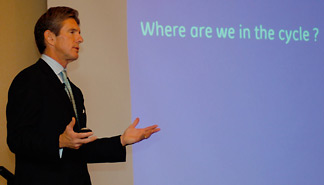Profiting despite falling U.S. real estate market: GE unit reaps big returns by global focus, says its CEO
By Kanika Arora

Think General Electric (GE), and you think of Thomas Edison's light bulb, which the company was formed to exploit. For the 24th Annual Cornell Real Estate Conference's keynote address, Michael E. Pralle -- president and CEO of GE Real Estate -- put GE in a different light: profiting in a troubled U.S. real estate market by turning to international and underserved markets.
"In 1993, we barely broke even. Those were challenging times for real estate," said Pralle to about 150 industry professionals, faculty, students and alumni in the Statler Ballroom, Oct. 5, as part of a two-day conference.
"However, since then our earnings have seen a consistent increase. One of the main strategies behind this success has been finding opportunities in multiple international markets," he said. This year, 57 percent of GE Real Estate's earnings came from acquisitions.
Since joining GE Real Estate (a unit of GE Commercial Finance), Pralle has transformed a little-known, largely domestic business into one of world's largest and most diversified commercial real estate investors and financiers, with a presence in 20 countries. Attributing the increase in GE Real Estate's growth to geographic diversification, Pralle noted that GE Real Estate contributes 7 percent of GE's total net income.
His core growth strategy, he said, is no secret: Manage the business through real estate cycles; establish a deeper presence in such large, underserved regions as Mexico and Eastern Europe; and maximize opportunities in emerging markets, particularly India and China -- and even high-priced Japan. "With favorable real estate and land prices and a robust economy with great liquidity, Japan holds a bright future as a real estate market for the U.S.," he said.
And, he noted, "Would you believe that we have only six delinquent loans in an $18 billion portfolio?"
But the future is not entirely rosy. Pralle pointed to high global property prices, high oil/commodity prices and low hurdle rates (the minimum amount of return that a company requires before making an investment).
"Home prices, consumer debt and trade deficit all show comparatively worse annual indicators," he said. At the same time, however, he offered an optimistic analysis: "They may be bad and may pose a legitimate cause for concern, but are certainly not terrible or alarming."
The two-day conference was sponsored by the Cornell Real Estate Council, which was created in the 1970s to enable alumni to assist the university with its real estate concerns. It now has more than 1,100 members.
Graduate student Kanika Arora is a writer intern with the Cornell Chronicle.
Media Contact
Get Cornell news delivered right to your inbox.
Subscribe